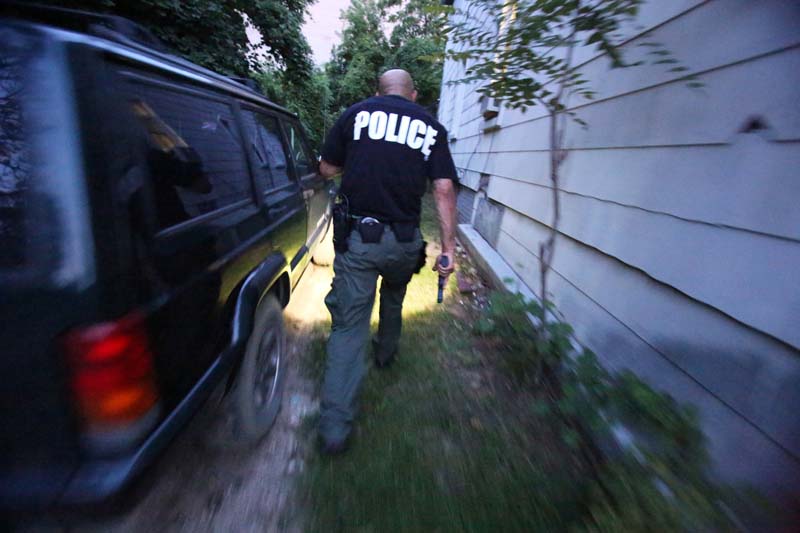Can Detroit pay its bills after bankruptcy?

Detroit is known by its most unwelcome attributes: It has one of the highest murder and violent crime rates in the country. And it currently is known as the most populous U.S. city to ever seek bankruptcy protection.
Can it also enjoy the biggest recovery?
So much is still up in the air – U.S. Bankruptcy Judge Steven Rhodes will decide whether to adopt the city’s cost-cutting plan following a trial that begins in August– that it’s not clear whether Detroit will be positioned to succeed a year from now.
But we can ask questions of its recent past to get a hint at its future: Does the city generate enough money to fix what ails Detroit if billions in debt are cut? Are the city’s costs too high? Does it pay its workers too much? Are pensions too generous? Can the city endure a reduction in both spending and revenue and revive what is by most measures the most dysfunctional large city in America?
“I think that’s one of the great questions coming out of bankruptcy: What is the budget going to be and what does the city need it to be?” said Eric Scorsone, a Michigan State professor and expert on city finances who is writing a book about Detroit’s financial history dating to the 1950s.
Big revenues, but still struggling
At first blush, Detroit doesn’t suffer from a revenue problem. It can count tax sources that most Michigan cities cannot (casino, utility and income taxes). And it gets the largest chunk of the state’s revenue sharing.
Its general fund (excluding money raised and spent by the water and sewerage department) generated nearly $1.7 billion in taxes and other revenues in 2011. At $2,346 generated per city resident, that’s 42 percent higher than the median ($1,650) of the country’s largest cities, according to a report last year by the Pew Charitable Trusts.
It also ranks tenth-highest among those 30 cities, below Washington, New York, San Francisco and others, but well above other Midwest cities Cincinnati, Chicago, Pittsburgh, Cleveland and Minneapolis.
Its coffers are filled with revenue sources unavailable to many cities in Michigan and the country: It has the state’s highest income tax (2.4 percent on residents, 1.2 percent on nonresidents), it has the highest property tax rate among Michigan cities of 50,000 or more people, and it is the only city in the state allowed to levy a utility tax (5 percent on phone, electric and gas).
It also has averaged $179 million in casino taxes over the last five years, money no other Michigan city gets.
Those taxes and revenues, including state revenue sharing, have come largely from nonresidents – nearly 80 percent is paid by corporations, nonresident landlords and suburbanites who work in the city. “Detroit is exporting a huge portion of its tax burden,” said Scorsone, the MSU city finance expert.
Dwindling resources
So the city has a healthy stream of cash, right? Well, it did. Property taxes have fallen and are expected to fall even farther as high property assessments are lowered, as has state revenue sharing (was $173 million in 2012, down from $272 million in 2008). Income taxes have dipped though risen recently. And the city’s utility tax generated $39.8 million in 2012, a 20 percent drop from 2008. Of the biggest revenue sources, only gambling taxes remained fairly steady.
In documents filed with the bankruptcy court, Emergency Manager Kevyn Orr’s experts have forecast that property tax revenues, which were $163.7 million four years ago, in 2009, will fall below $100 million in 2017 and continue to fall until 2020. It’s the result of falling property values in a city where just under half its property owners failed to pay their property tax bills.
Those fluctuating – mostly downward – revenue streams are what makes the city’s fiscal future hard to predict. Though Detroit’s property tax revenues comprise a smaller fraction of the city’s overall revenues than most cities (11 percent in 2011, compared to an average of 26 percent for the 30 other cities in the Pew study), their downward path is both steady and stunning.
“I think the biggest number to bottom out is property taxes,” said Irv Corley, financial analyst for the Detroit City Council.
But utility taxes are also falling and although Lansing is willing to pitch in on the “Grand Bargain” that pools $816 million of private and public dollars to stave off the sale of art at the Detroit Institute of Arts and helps soften the blow to city pensioners, it is unlikely more money is coming from the state.
“We’re losing revenue,” Corley acknowledged. “Hopefully we’re going to start seeing some stabilization.”
City salaries cut to the bone
Revenues alone do not a budget make. Cities hire workers, buy materials and provide services that cost, in places the size of Detroit, billions of dollars. Much of the money spent each year is on labor and critics have long implored Detroit to trim its workforce as its population fell and fewer workers were needed to haul trash, clean parks and patrol streets.
“(Detroit’s) got some high labor costs,” said Kil Huh, director of state and local fiscal health at Pew.
And yet the city has slashed staff by the tens of thousands over the years. In the 1960s, Detroit ran three hospitals, a welfare department and had more than 40,000 workers. By 2002, there were still more than 18,000 city workers. Now there are fewer than 12,000 and more cuts are anticipated.
And the city has slashed salaries, health care benefits and pensions. Even disgraced former Mayor Kwame Kilpatrick pushed through steep cuts in worker and retiree health care and mayors since have cut into worker pay. Before Orr was able to impose labor terms, union workers endured pay freezes and furloughs and took a 10 percent cut in 2011.
OK. So maybe the city still pays too well and offers pensions that remain too lucrative?
Not anymore.
Comparing workers’ pay from one city to another can be misleading, since jobs with similar titles can involve vastly different responsibilities and qualifications.But you can get an idea for how Detroit stacks up by looking at one worker that most cities have: Police officers.
By that measure, Detroit is way down the list in salaries paid. Consider: A starting police officer in Detroit, one of the nation’s most dangerous cities, stands to make just over $30,000 before overtime. In Indianapolis starting pay is $39,446 – with a bump to $47,651 after a year. A starting cop in Pittsburgh makes nearly $42,000; in Cleveland, $45,905, and in Minneapolis, over $54,500.
Each of those cities generates less revenue per person than Detroit does, yet pays their cops more generously.
Pension costs average
The average pension of a Detroit police officer or firefighter is a little over $30,600 (they’re not eligible for Social Security, while retirees in other cities are), while the average for other retired city workers is an even more modest $19,200.
To Orr and many others who have studied Detroit’s fiscal trouble, the problem isn’t the generosity of the city’s pension plans, it’s the degree to which the city’s pension and retiree healthcare plans are underfunded. For decades, the city failed to put enough in during lean years, leaving the pension fund short $3.1 billion.
Even worse, perhaps, were the instances of alleged fraud or mismanagement with some pension proceeds. And in an effort to address the pension debt, the city made more bad financial moves, like borrowing $1.4 billion in 2005 and 2006 to shore up the funds. The loan became a fiscal millstone when the city agreed to an interest-rate “swap” to ensure low interest rates. When it backfired, it created an additional annual payment of $50 million.
That’s $50 million in city revenue each year that’s not paying cops or removing blighted structures or paving roads. It’s $50 million Orr hopes to eliminate in bankruptcy court.
Crippling legacy costs
And yet that obligation is a relative pittance compared with another looming debt: the city’s $4.3 billion commitment for retiree health care.
For perspective: Los Angeles, a city six times larger than Detroit, has a $5.5 billion health-care bill. But L.A. has put aside more than $3 billion, according to Pew. Detroit, at the time of its 2009 comparison to Los Angeles, had set aside just $25 million.
When Huh, of Pew, says Detroit has high labor costs, he doesn’t mean it pays too much to city workers or that its benefits are too sweet. He’s pointing to this unfunded debt to former workers. It chews up more than a third of the city’s budget each year.
To recap: The city enjoys considerable income streams; money coming from income taxes, property taxes, utility taxes, wagering taxes that make it a top city. But it’s also carrying a huge debt to former workers – many of whom worked for the city when it was twice as big as it is now.
Something had to give.
“Those things aren’t lining up,” Huh said. “It’s long-term liabilities aren’t affordable.”
That’s one reason why Orr took the city into bankruptcy. Until Judge Rhodes rules on the city’s plan, we simply won’t know for sure if the city’s balance sheet is sustainable.
In Huh’s view, Detroit has not made cuts and addressed its problems fast enough. “It just hasn’t right-sized the way other cities have,” he said.
As Mayor Mike Duggan works to streamline the city’s administration, he does so with problems that can only be resolved with more cash. In part, that’s why Orr hopes to pour $1.4 billion in new spending into the city over 10 years if his debt cuts are accepted by Rhodes. The money is targeted toward fighting blight and improving long-neglected city services.
As one, small example: The city needs a new payroll system. The current system is antiquated and too reliant on city workers – rather than an efficient computer system. The city currently spends $62 just to process every check, four times the national average. And more than a third of its nearly 150 payroll workers are sworn uniformed police officers doing jobs that in most cities are done by clerical workers.
To work, a city has to grow. To grow, a city has to be attractive. To be attractive the city has to fix its mess. Until the judge rules on Detroit’s financial game plan in bankruptcy court, we won’t know if city will finally measure up.
See what new members are saying about why they donated to Bridge Michigan:
- “In order for this information to be accurate and unbiased it must be underwritten by its readers, not by special interests.” - Larry S.
- “Not many other media sources report on the topics Bridge does.” - Susan B.
- “Your journalism is outstanding and rare these days.” - Mark S.
If you want to ensure the future of nonpartisan, nonprofit Michigan journalism, please become a member today. You, too, will be asked why you donated and maybe we'll feature your quote next time!


 Despite working on one of the country's most dangerous cities, Detroit police are paid less than peers in other large Midwest cities. (Photo by Brian Kaufman/Detroit Free Press; used by permission)
Despite working on one of the country's most dangerous cities, Detroit police are paid less than peers in other large Midwest cities. (Photo by Brian Kaufman/Detroit Free Press; used by permission)